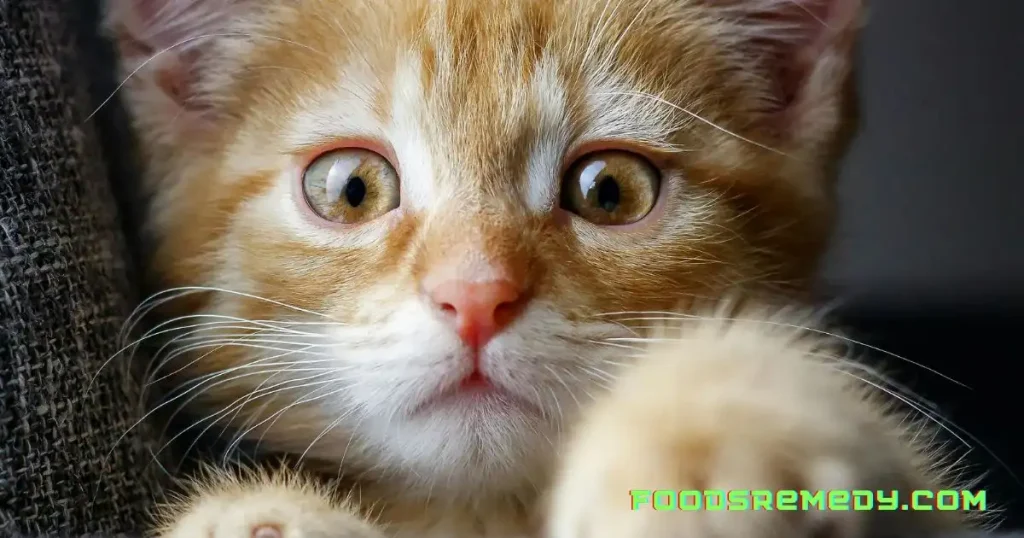To treat cat ear infections at home, gently clean the ear with a vet-approved cleanser and apply a prescribed topical treatment. Consult your veterinarian promptly for specific recommendations.
Dealing with a cat ear infection can be challenging yet manageable with proper care. Recognizing the signs early—such as head shaking, ear scratching, and discharge—is crucial. The comfort of your feline friend is important, and addressing ear issues quickly helps prevent more serious complications.
Remember, home remedies should only be used after consulting a veterinarian to ensure the infection isn’t severe or doesn’t require systemic medication. Each step you take at home should align with veterinary advice to safely alleviate your cat’s discomfort and promote healing. Safeguard your pet’s health by ensuring any treatment plan for an ear infection is vet-approved, thereby dodging risks associated with improper care.
Feline Ear Health: Why It Matters
Keeping your cat’s ears healthy is vital to their overall well-being. Cats rely on their acute hearing for safety and communication, just as much as sharp vision or agile movements. An ear infection can cause discomfort and lead to more serious health issues if left untreated. Understanding ear health ensures your furry friend stays happy and playful.
Critical Role Of Ear Health In Cats
Cats have an incredible sense of hearing, which hinges on healthy ears. An infection hampers their natural instincts to listen for subtle sounds. This could impact their ability to detect prey or sense danger. Keeping their ears clean and infection-free is a key part of routine feline care.
Signs Your Cat May Have An Ear Infection
- Head shaking or head tilt
- Scratching or pawing at the ear
- Redness or swelling inside the ear
- Dark, waxy discharge
- Unpleasant odor from the ear
- Lethargy or irritability
Spot these early signs to give your cat prompt care and relief. Regular checks are a straightforward way to avoid complications linked to ear infections. It’s a crucial part of pet health maintenance, and a happy cat means a happy home.
Identifying The Culprit: Causes Of Cat Ear Infections
Cat ear infections can be a real nuisance for both the pet and the pet owner. Understanding what causes these infections is key to preventing and treating them effectively. Let’s explore the common causes of feline ear issues.
Common Pathogens In Feline Ear Infections
Cat ears can fall prey to various infectious agents. Bacteria and yeast are the usual suspects causing discomfort and inflammation.
- Bacteria: Staphylococcus and Pseudomonas species
- Yeast: Malassezia pachydermatis
- Ear Mites: Tiny parasites that cause intense itching
Factors Contributing To Ear Problems In Cats
Several factors can increase a cat’s risk of developing an ear infection. It’s important to be aware of these to protect your pet.
| Factor | How It Contributes |
|---|---|
| Allergies | Trigger inflammation and overproduction of earwax |
| Wax Buildup | Provides a breeding ground for pathogens |
| Autoimmune Diseases | Weakens the ear’s defense mechanisms |
| Foreign Bodies | Grass seeds or dirt can irritate the ear canal |
| Trauma | Breaks in the skin allow bacteria or yeast to enter |
| Poor Ear Hygiene | Increases the risk of infection |
Regular checks and cleaning can help prevent these factors from causing problems.
Prevention First: Reducing The Risk Of Infections
Keeping your cat’s ears clean and healthy is essential to prevent infections. Learn easy steps to reduce the risk and safeguard your feline friend’s hearing.
Routine Ear Cleaning Regimen
Regular ear checks ensure early signs of trouble get spotted. Gentle cleaning with a vet-approved solution keeps ears debris-free.
- Inspect ears weekly.
- Use a damp cloth to wipe the outer ear.
- Avoid inserting anything into the ear canal.
Lifestyle Adjustments For Healthier Cat Ears
Good hygiene and a dust-free environment support ear health. Dry ears after baths to prevent moisture buildup, which breeds infections.
| Factor | Action |
|---|---|
| Hygiene | Regular grooming |
| Home | Maintain cleanliness |
| Bathing | Avoid water in ears |
| Checkups | Semi-annual vet visits |

Safe Home Remedies For Mild Ear Infections
Cat ear infections need prompt attention. Mild cases might find relief with safe home remedies. Remember, these are for minor issues. If your cat shows severe symptoms, consult a vet.
Herbal Solutions: Nature’s Antibiotics
Nature provides herbal helpers that act as gentle antibiotics. A few drops of olive oil mixed with garlic can combat mild infection. Use only proper dosage and diluted formulations for safety.
- Calendula: Soothes with anti-inflammatory properties.
- Mullein: Offers natural pain relief and reduces swelling.
- Yellow Dock: A weak tea can act as an antiseptic rinse.
Gentle Cleansing With Homemade Solutions
Keeping ears clean is key. Homemade cleaners can help. Mix equal parts of apple cider vinegar and purified water. Use a dropper to apply gently. It balances pH and removes dirt.
- Combine the vinegar and water in a bowl.
- Fill a dropper.
- Hold your cat securely, tilt its head, and apply a few drops.
- Massage the base of the ear to help the solution work its way in.
- Wipe away any excess with a soft cloth.
Navigating Home Treatments: Dos And Don’ts
When your feline friend starts scratching their ears or shaking their head, it might indicate an ear infection. Understanding safe and effective home remedies can help soothe your pet’s discomfort. Below, discover the best practices to adopt and the pitfalls to steer clear of in self-managing cat ear infections from the comfort of your home.
Practices To Embrace For Treating Cat Ear Infections
Early detection is key to managing ear infections in cats. Keep an eye out for symptoms like ear odor, discharge, or excessive scratching. Consider these steps:
- Inspect your cat’s ears regularly for signs of redness, discharge, or foul smell.
- Clean the external ear with a soft cloth or a cotton ball dipped in a vet-approved solution.
- Provide a quiet rest space for your cat to recover, away from noise and stress.
- Ensure your cat’s diet is nutritional to support their immune system.
- Contact your vet for professional advice before starting any treatment.
Common Mistakes To Avoid In Home Care
Missteps in home care can aggravate your cat’s condition. Note these vital points:
| Don’t | Do Instead |
|---|---|
| Use cotton swabs inside the ear canal. | Stay clear of the ear canal to prevent damage. |
| Apply home concoctions or essential oils without vet consultation. | Seek vet guidance for safe treatment options. |
| Igore persistent symptoms. | Book a vet appointment for ongoing issues. |
| Underestimate the seriousness of ear infections. | Understand complications can arise without proper care. |
By following these dos and don’ts, you can safeguard your cat’s health and assist in their swift recovery. Regular vet check-ups and mindful observations at home will keep your cat’s ears healthy!

When To Seek Veterinary Intervention
As a cat owner, you care deeply about the well-being of your feline friend. Dealing with a cat ear infection can be challenging. Knowing when to seek veterinary intervention is essential. Home remedies may offer temporary relief, but they have limits. Your cat’s health is crucial, and timely professional care can prevent serious complications.
Recognizing The Limits Of Home Remedies
Home treatments might provide comfort to your pet. But, there are signs that require immediate attention from a vet. Watch for these:
- Continued scratching of the ear after using home remedies
- Discharge that is yellow, brown, or contains blood
- Unpleasant smell coming from the ear
- Behavior changes like aggression or depression
- Eating less or not at all
If your cat shows these signs, stop home treatments. Call a vet right away. Serious infections need professional help.
The Importance Of Professional Diagnosis
A vet will diagnose the ear condition correctly. They use special tools to look deep into the ear canal. They might also test samples to find the issue. Ear problems can point to greater health concerns. These include allergies, mites, or more serious diseases. Only a vet can tell for sure.
Don’t ignore possible signs of a deeper health problem. The early detection from a professional can save your cat from pain. It can also lower the chance of long-term damage to your cat’s ears. A vet will prescribe the right medicine or treatment. This might be drops, cleaning solutions, or other therapies that home remedies can’t provide.
Integrating Home Remedies With Veterinary Advice
When your furry friend shows signs of ear discomfort, it’s crucial to seek a vet’s guidance. But a vet might also suggest home remedies that can comfort your cat and aid recovery alongside professional treatment. An effective approach combines the best of both worlds – veterinary expertise and the gentle touch of home care.
Combining Professional Treatment With Home Care
Always consult your vet before trying any home remedies. They know your cat’s health best and will recommend safe options.
- Maintain cleanliness: A clean environment minimizes infection risks.
- Regular ear cleaning: Your vet can suggest a gentle cleaner to use at home.
- Applying prescribed medicine: Ensure you properly apply any medications as instructed.
- Herbal drops: Some natural drops may soothe irritation, but only use vet-approved options.
Remember, professional treatments are the priority. Use home care to support these efforts.
Monitoring Progress And Adjusting Treatment
Keep a close eye on your cat’s ear health once treatment begins.
| Signs of Improvement | Signs of Worsening |
|---|---|
| Less scratching | Increased discomfort |
| Reduced redness | Foul odor |
| Better mood | Discharge from the ear |
Adjust treatments based on your vet’s advice.
- Set regular check-ins: Schedule follow-up visits with the vet.
- Track symptoms: Note any changes in your cat’s behavior or ear appearance.
- Stay patient: Recovery takes time, so be consistent with treatment.
With careful monitoring and your vet’s guidance, your cat should be on the path to better ear health.
Fostering Long-term Ear Health In Your Cat
Your cat’s ear health is crucial for its overall well-being. Chronic ear infections not only cause discomfort but can also lead to serious complications if left untreated. The key to preventing these issues lies in maintaining good ear health over the long term. In this section, we will delve into the essentials of keeping your feline friend’s ears in top condition.
Implementing Preventative Care Strategies
Regular checks and cleaning play a pivotal role in preventing ear infections. Here’s how you can incorporate these practices:
- Inspect ears weekly for signs of redness, odor, or discharge.
- Use a vet-approved ear cleaner to gently wipe the outer ear.
- Avoid inserting anything into the ear canal; this could be harmful.
Maintain a routine vet schedule for professional cleanings and assessments. This ensures any potential issues are caught early.
Understanding The Connection Between Diet And Ear Health
The role of diet in ear health is often underestimated. A balanced diet supports a strong immune system, which is vital in fighting infections. Consider these points:
| Nutrient | Benefits |
|---|---|
| Omega-3 Fatty Acids | Reduce inflammation and support skin health. |
| Antioxidants | Combat oxidative stress and boost immunity. |
| Probiotics | Enhance gut health and immune function. |
Ensure your cat’s diet includes these key components. Consult with a veterinarian for tailored advice, especially if your cat has a history of ear issues.
Supplements And Nutrition For Optimal Ear Health
Ensuring optimal ear health for your feline friend involves more than just regular cleanings. Like humans, cats can greatly benefit from the right supplements and nutrition. This approach can boost their natural defenses against infections. In this dedicated section, we’ll delve into how specific supplements and natural nutrients can play a crucial role in preventing and aiding the treatment of ear conditions in cats.
Natural Supplements Beneficial For Ear Conditions
Nature offers a treasure trove of remedies that can be gentle on your cat’s system while effectively bolstering ear health. Consider these natural allies:
- Omega-3 Fatty Acids – Oils from fish like salmon are rich in Omega-3s, which can reduce inflammation.
- Vitamin E – This antioxidant promotes skin and ear health, helping to repair damage.
- Probiotics – These beneficial bacteria support a healthy immune system and gut, indirectly aiding ear health.
Dietary Tweaks To Support Ear Health
A balanced diet is vital for overall health, and specific tweaks can especially benefit your cat’s ears. Here are some nutritional adjustments:
| Food Type | Benefits |
|---|---|
| Lean Proteins | Builds immune strength |
| Complex Carbohydrates | Stabilizes blood sugar levels |
| Water-Rich Foods | Keeps hydration levels up |
Remember, quality over quantity always matters in your cat’s diet. Keep processed foods to a minimum and focus on whole-food ingredients. A robust diet helps maintain strong immunity, which is your cat’s best defense against ear infections.

Frequently Asked Questions
How Can I Treat My Cat’s Ear Infection At Home?
To treat your cat’s ear infection at home, first consult your vet for appropriate medication. Gently clean the ear with a vet-approved cleaner. Administer prescribed drops. Avoid over-the-counter remedies without veterinary advice, as some can be harmful. Keep the cat’s ears dry and clean.
Does Apple Cider Vinegar Help Cat Ear Infections?
Apple cider vinegar is not a scientifically proven treatment for cat ear infections. Always consult a vet for appropriate care.
What Is The Best Homemade Cat Ear Cleaner?
A simple homemade cat ear cleaner can be a mix of equal parts apple cider vinegar and warm water. Use a cotton ball to gently cleanse the ear.
Can I Clean A Cat’s Ear Infection?
Yes, you can clean a cat’s ear infection with vet-approved solutions. Always consult a veterinarian first and follow their instructions for safe cleaning. Avoid using home remedies or over-the-counter medications not designed for cats. Regular cleaning can prevent future infections.
Conclusion
Dealing with a feline ear infection can be worrisome, but remedies are at hand. These home treatments offer relief and are gentle on your pet. Remember, persistent symptoms warrant a vet visit. Your vigilant care keeps your cat healthy and happy.
Share your success stories with other cat lovers.

